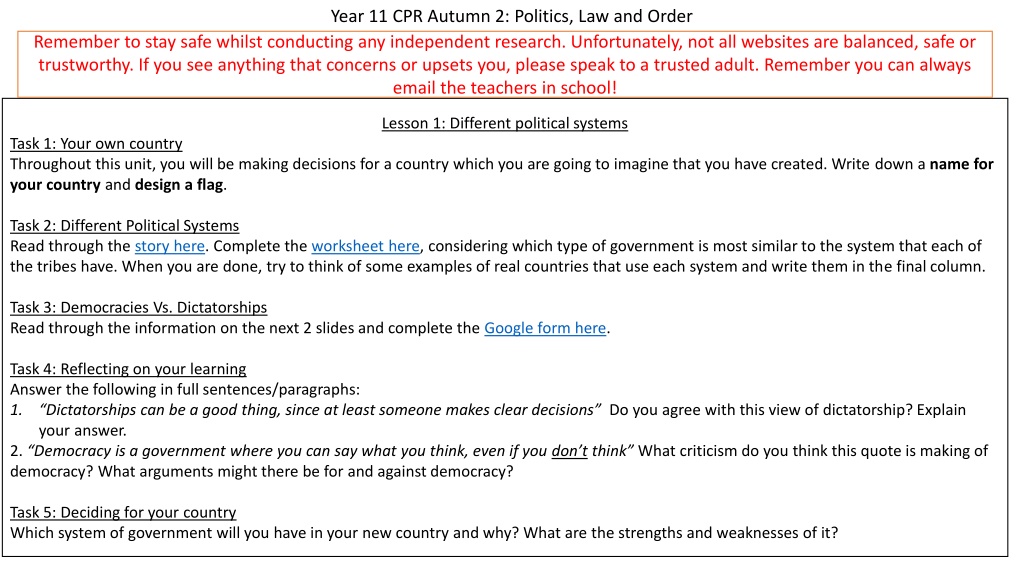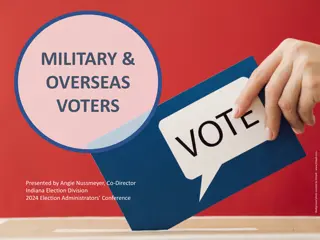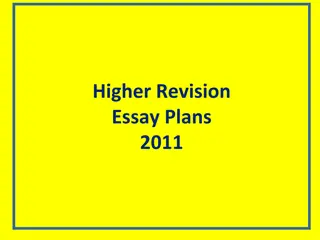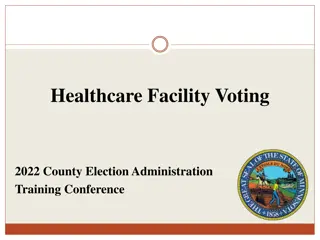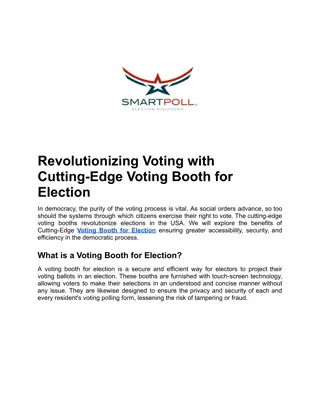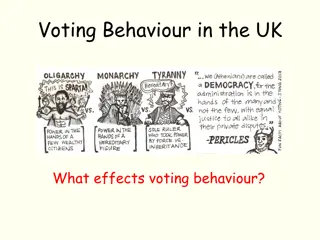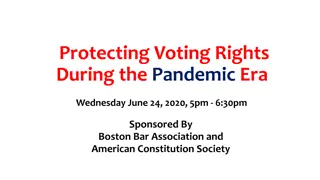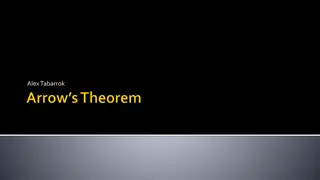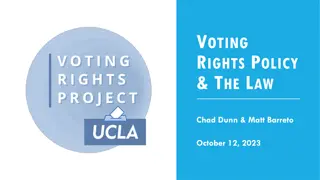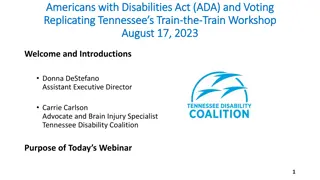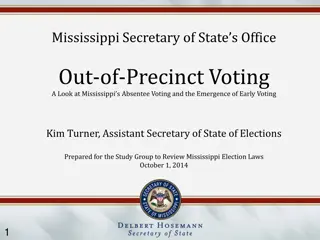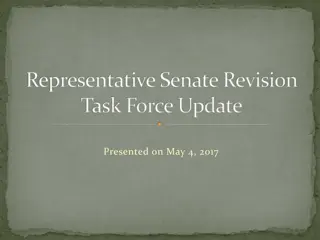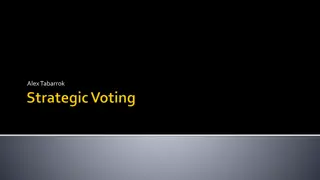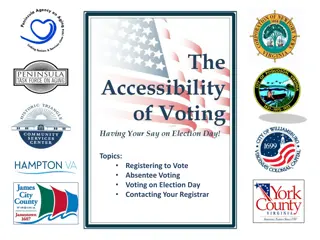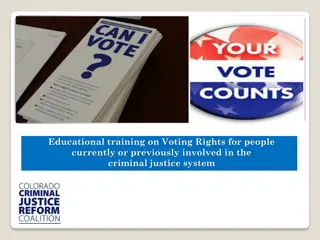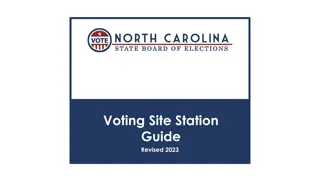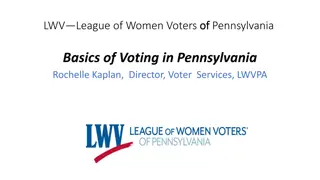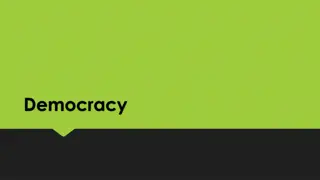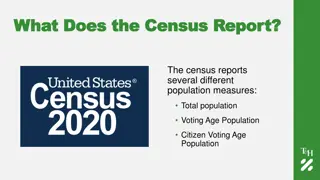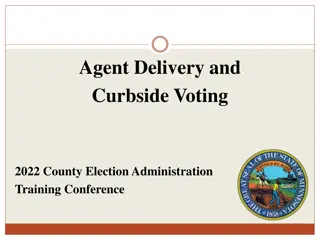Understanding Political Systems and Types of Voting
Explore different political systems, democracies vs. dictatorships, and types of voting processes in this engaging lesson plan. Students will learn to make informed decisions for their imaginary country as they delve into the intricacies of governance and electoral systems. From designing flags to analyzing voting methods, this lesson fosters critical thinking and civic awareness.
Download Presentation

Please find below an Image/Link to download the presentation.
The content on the website is provided AS IS for your information and personal use only. It may not be sold, licensed, or shared on other websites without obtaining consent from the author. Download presentation by click this link. If you encounter any issues during the download, it is possible that the publisher has removed the file from their server.
E N D
Presentation Transcript
Year 11 CPR Autumn 2: Politics, Law and Order Remember to stay safe whilst conducting any independent research. Unfortunately, not all websites are balanced, safe or trustworthy. If you see anything that concerns or upsets you, please speak to a trusted adult. Remember you can always email the teachers in school! Lesson 1: Different political systems Task 1: Your own country Throughout this unit, you will be making decisions for a country which you are going to imagine that you have created. Write down a name for your country and design a flag. Task 2: Different Political Systems Read through the story here. Complete the worksheet here, considering which type of government is most similar to the system that each of the tribes have. When you are done, try to think of some examples of real countries that use each system and write them in the final column. Task 3: Democracies Vs. Dictatorships Read through the information on the next 2 slides and complete the Google form here. Task 4: Reflecting on your learning Answer the following in full sentences/paragraphs: 1. Dictatorships can be a good thing, since at least someone makes clear decisions Do you agree with this view of dictatorship? Explain your answer. 2. Democracy is a government where you can say what you think, even if you don tthink What criticism do you think this quote is making of democracy? What arguments might there be for and against democracy? Task 5: Deciding for your country Which system of government will you have in your new country and why? What are the strengths and weaknesses of it?
Year 11 CPR Autumn 2: Politics, Law and Order Lesson 2: Types of Voting Task 1: Key words Find out what each of the following mean. Write down their definitions: electorate, turnout, referendum, general election, polling station, secret ballot, ballot paper, constituency. Now, write a paragraph that describes how democracy in the UK works using all of the key words. If you need a sentence starter, there is one below. Once upon a time in Britain, there was a general election. On the big day, the electorate went out to the polling stations Task 2: After the elections After the elections, we have to work out who has won. Different countries have different ways of counting votes. In the UK, we use the First Past the Post system. Watch this video to find out about it. This video is quite critical of it, but try to think about the strengths of the system, too. There is another system, called Proportional Representation. Watch this video here to find out more. Then, complete the task on the next slide. In May 2011, people in the UK voted on which method of voting they preferred to use in order to choose future governments. They were given the choice of two voting methods known as First Past the Post and another system called Alternative Vote . First Past the Post Vote for one candidate only . FPTP is the system that has traditionally been in place in the UK. Each person votes, by putting a cross, next to one candidate only. The most popular candidate wins. Alternative Vote Rank as many candidates as you wish to vote for . Each person ranks as many of the candidates as they wish, in order of preference. To win, a candidate must be most popular and gain more than 50% of votes. If this is not achieved by considering No.1 preference votes only, then No.2 preference votes from the lowest scoring candidate of the first round are distributed and votes recounted. This process continues until a candidate satisfies both conditions and wins. In the 2011 referendum, it was voted to keep the first past the post system of voting. It has been suggested that Proportional Voting might be an even better system. There are strengths and challenges to each voting system. Task 3: Your country What system would you use to count the votes in the country you created in lesson 1? Is there an even fairer system that you can think of Explain your ideas.
Sort the points below into those which are talking about First Past the Post and those which are talking about Proportional Representation . Then decide which are problems, and which are advantages for each system. One ruling party means that you get a strong government There is one very clear winner The proportion of representatives reflects the votes cast, and so people s views, more accurately Losers still get a say when it comes to debate in parliament but a decisive government can decide on clear plans More parties get a place in government more views are represented It is easy to do: just count the votes & the person with the most, takes it all Extreme parties will also get represented (e.g. the BNP) A party might have a minority of total votes, but majority of seats, and so still win If you pick the eventual loser, your vote doesn t count any more, or affect the outcome so lots of votes are wasted A big mixture of parties means it is more difficult to decide on government policy they may end up stuck in arguments! People end up voting just for main parties because they don t want to back a loser and waste their vote 5
Year 11 CPR Autumn 2: Politics, Law and Order Lesson 3: How is Great Britain governed? Task 1: Parliament and government Watch the video here and complete the gaps in the sentences on the next slide. Watch this video to understand how the government are held to account . Background information General Election In a general election, those who are over 18 and eligible are invited to vote. The person who wins the most votes in an area, gets the seat for that area in parliament. Parliament is made up of three parts the House of Commons, the House of Lords and the Monarch. The Government is made up of ministers (senior MPs or Lords with particular jobs), cabinet (around 20 MPs/Lords chosen by the Prime Minister), and the Prime Minister. Task 2: Where does the power lie in the UK? Complete the worksheet here. You need to: 1. In one colour, place each letter where you think it should go to be accurate to the UK today. 2. In a second colour, place each letter where you think it should go in your ideal society/the country you created Task 3: Answer these questions in full sentences: (i) What is the difference between parliament and government? (ii) Why is it important that parliament scrutinises the work of government? How do they do this? (iii) How is power balanced between different groups and people in the UK parliament? (iv) Using all you have learned so far, what would you change about the system in the UK and why? (v) Based on what we have learnt so far, what actions can a citizen take in democratic and electoral processes to influence decisions locally, nationally and beyond?
The UK government is made up of about ______ ministers. Each minister is in charge of a different area of work, for example _____________, _____________ or _______________. Government s work is checked up on by ______________. It is the UK s highest legislative body . This means that it __________ and ___________ most of the laws in the UK. Parliament also checks up on what the government is doing. This is called _______________. Parliament has three parts, the House of Commons, House of Lords and the Monarch (King or Queen). The House of Commons contains all the MPs. There are _________ in total. (Actually, this has changed since this video was made: there are now _________) SCRUTINISING!In order to check that the government is doing its job well and spending taxpayers money properly, parliament asks the government _______________ _______________ and forms _____________________ which focus on the work of certain departments. The House of Lords also _________________. They also help to ______________ ______ ___________ BONUS: What colour is associated with The house of commons? ___________ The house of lords? ______________
Year 11 CPR Autumn 2: Politics, Law and Order Lesson 4: Human Rights and International Law Task 1: Starter thoughts You now have a named country, with a flag, system of government and voting system. What are you going to have in place to keep your people safe? Task 2: Value of human life Look at the information on the next slide and complete the task in the purple box Each of these people s lives have value. In the U.K. the death penalty is illegal because of the right to life . What do you think about that? Task 3: What are human rights and where did they come from? Watch the video here and fill in the timeline sheet here. You may need to watch it more than once or pause it as you watch it to get the key points down. Background information Human rights are based on important concepts, like dignity, fairness, respect and equality. They protect you in your everyday life regardless of who you are, where you live and how you choose to live your life. Some examples of human rights are: The right to life The right to respect for a private family life The right to freedom of religion and belief Task 4: International Law International law helps to protect victims of conflict and sets out rules of war. This aims to protect international relations between countries. It can also include treaties and agreements. Watch this video and answer the following: What is the purpose of international law? Why is international law important? How does it link to human rights? Task 5: Your country What rights would you have in the country you have invented? How will they help to protect your people?
The value of a human life? A mother This woman is parent to 2 young children under the age of 5. She looks after her children at home. Nicholas Winton This Englishman rescued 669 children from the Holocaust. A young person who experiments with drugs This person has tried a few different drugs such as cannabis and mushrooms. He has committed no serious crimes but what he has done is illegal. Convicted criminal This person has been convicted of rape and murder and has been sentenced to spend the rest of his life in prison. Where would you put each of these people on this scale? Task: Copy the arrow scale onto your paper and plot each person on it, to show how much value you feel that life has This life has no value at all. This life has significant value.
Year 11 CPR Autumn 2: Politics, Law and Order Lesson 5: Legal System in the UK Task 1: Your country Make a list or mind map of laws that you would have in the country you created. How would the laws be decided? Who would have an input? Would anybody be able to challenge the laws? Task 2: How laws are made in the UK Why do we have laws? What might the country be like if we did not have them? Make a list or mind map of your ideas. Watch this video and draw a flow chart to show the process that a bill goes through in the UK to become a law. Task 3: How laws are enforced in the UK In the UK, we have what is called the separation of powers. Look at the diagram on the next slide to better understand this. Ultimately, it is the idea that the judiciary, parliament and executive government are all independent of each other and have separate roles. Within everyday society, the police enforce laws. In the UK legal system, the police: Keep people safe and prevent crime Investigate crime Arrest and charge suspects Collect evidence Brief the Crown Prosecution Service (CPS) Give evidence in criminal courts. The police need to carry out their duties fairly and justly. For these reasons, police work is regulated by codes of behaviour and laws. When people know what to expect from the police and feel confident of fair treatment, police work will be more effective. Police officers are trained to know their responsibilities as well as their rights. Answer the questions here.
Year 11 CPR Autumn 2: Politics, Law and Order Lesson 5 Cont.: Legal System in the UK Task 3 continued: People in trouble with the police or making a claim through the civil justice system will need legal advice. People have a right to free legal advice if they are questioned at a police station. In criminal cases, trained lawyers prepare cases. Lawyers work on behalf of the Crown to prosecute the accused person or seek to defend the accused person against the charges brought against them. Citizens wanting professional legal representation usually go to a solicitor but it is also possible to directly to a barrister. Lawyers working on criminal cases are often asked why they are willing to defend people charged with criminal offences. Without legal representation for accused people, our criminal justice system would be very unjust. For justice to be done, defendants should have the right o legal advice and assistance. Remember not everyone who faces criminal charges is guilty. In your own words, explain why those accused of crimes should have a lawyer. Task 4: Reflecting on the legal system What aspects of the UK legal system do you agree with? Which would you take to the country that you created? Who would enforce the laws in the country you created? How would you ensure that people got a fair trial when accused of a crime in the country that you created?
Year 11 CPR Autumn 2: Politics, Law and Order Lesson 6: Causes of Crime Task 1: A psychologist s view Listen to this psychologist s view on what makes someone a criminal. What does he say causes someone to commit crime? Do you agree or disagree with what he says? Task 2: Key words Find out what each of these key words mean. How might they link to crime? Social Environmental Psychological Task 3: What makes someone a criminal? Copy the outline of the person from the next slide and complete the task on the slide. Do you think that: You are born to commit crimes? Your genes/ emotions etc (Psychological) It is where you grow up? (environmental) Or the people you meet/ things You learn/ how you are brought up- that lead to crime? (Social)
Copy down this outline of a person On the inside write: Human/ Psychological causes e.g. jealousy, anger, mental illness On the outside write: Social and Environmental On the outside- E.G. Poverty, class Environmental Social Human reasons- psychological - drug and alcohol abuse -violence in the home - mental disturbance - emotional stress - lack of education - Poverty Add your own examples ..
Year 11 CPR Autumn 2: Politics, Law and Order Lesson 7: Types of Punishment Task 1: How would you punish crimes? In the country that you have created, how would each of the following be punished? Steve stole a bag from a bag of crisps Dave went into a shop and threatened a shop assistant with a knife for some scratch cards and money Samantha s boyfriend constantly beat her up. One time she feared for her life and picked up an iron to hit him with. She killed him Dorothy is an 87 year old pensioner who is refusing to pay her gas bill. Malcolm is refusing to pay his parking fine Jim is an animal rights activist, campaigning for his cause by chaining himself to the gates of a laboratory Task 2: How have punishments changed over time? Watch this video. Answer the following questions: Why is it so important that laws and punishments change over time? Challenge: What factors might impact how a society punishes those who commit crimes? Task 3: Types of punishment Read through the information on types of punishment here and complete the worksheet here. Task 4: Your views Below is the law for each of the crimes that you considered in task 1. Which do you agree with? Which would you change? Which type of punishment is each one? Steve stole a bag from a bag of crisps Stealing; Up to 5 years imprisonment cautions, criminal record, pay a fine Dave went into a shop and threatened a shop assistant with a knife for some scratch cards and money - Knife/theft; Maximum penalty for an adult carrying a knife is four years in prison and a fine of 5000 Samantha s boyfriend constantly beat her up. One time she feared for her life and picked up an iron to hit him with. She killed him. - Killing an abusive partner. They would need to prove in court that it was self-defence, to get charged with manslaughter. Under current laws, people who kill their partner after years of abuse are at risk of being convicted of murder, which carries a life sentence Dorothy is an 87 year old pensioner who is refusing to pay her gas bill. - Pensioner not paying bills; Taken to court and fined if this is not paid back, a short term jail sentence. This has been the case for a number of pensioners Malcolm is refusing to pay his parking fine. - Car parking fine; If not paid in 28 days, fine increases. If it is still ignored, it is referred to a court/bailiff Jim is an animal rights activist, campaigning for his cause by chaining himself to the gates of a laboratory - Animal Rights Activists; Depends on the actions Lots of tax payers money is spent on funding police units, who have to deal with such groups who disturb the peace. One example an animal rights extremist got 4 years in jail whilst his accomplice David Griffiths received a 30 week jail sentence.
Please email your work to Miss Colmer on colmer-Rachael@mayfield.Portsmouth.sch.uk, and she will send you feedback. Additional extra CPR work Helping you to prepare for life after school Remember, you can also log into unifrog and complete careers-based tasks on there, considering your plans and options for the future https://www.unifrog.org/ There is also the flying start website here https://www.sunoutreach.org/flying-start/?flying-start- categories=flying-start-portsmouth with local options and advice
